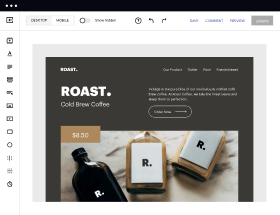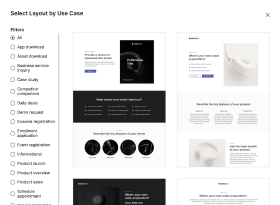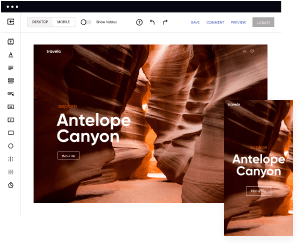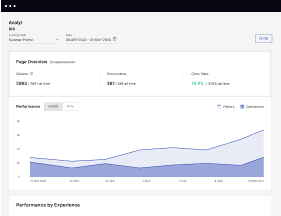Bring your ideas to life with Instapage's material design maintenance page template
Unleash your creativity with the material design maintenance page template. Try Instapage today.

Easy to build without coding
With the intuitive drag-and-drop builder, anyone on your team can create high-converting pages without any knowledge of code or design. Make enhancements to your landing page with custom widgets using Javascript, HTML/CSS, or third-party scripts.
Multiple layouts for any industry and goal
Select from 500+ landing page layouts built to boost conversions across industry-specific scenarios. Customize them by adjusting fonts, adding images, and generating on-brand content with the AI assistant. Quickly scale with Instablocks® and Global Blocks that you can save, reuse, and update globally.
Loads fast and looks polished on any device
Every template is responsive, which means they present professionally on any device and load blazingly fast with our Thor Render Engine. You can also power them up with Google AMP technology to deliver an unparalleled mobile experience and drive higher conversions.
Robust analytics & experimentation
Get real-time updates and reporting across all your devices, showing the number of visitors, conversions, cost-per-visitor, and cost-per-lead. Launch AI-powered experiments, run A/B tests, and use heatmaps to analyze user behavior, then optimize your landing page to maximize conversions.
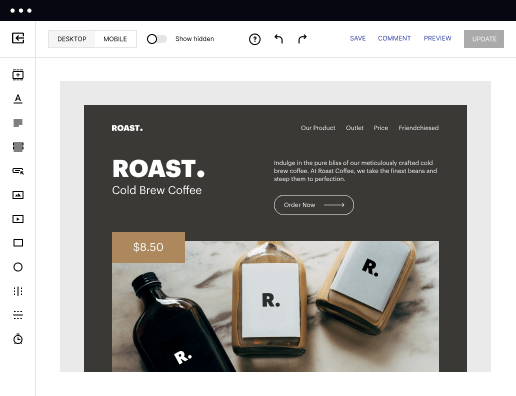
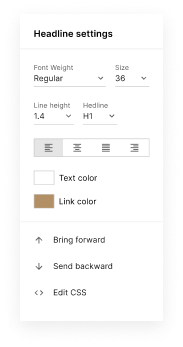
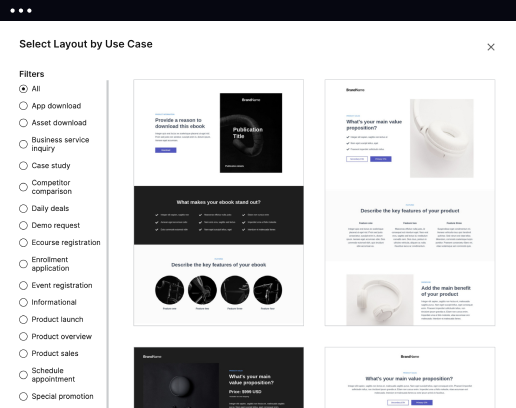
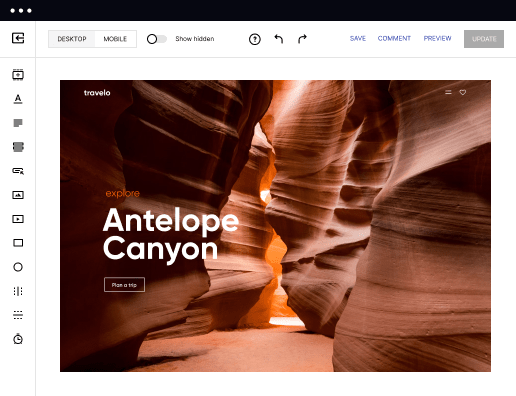
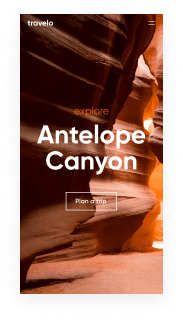
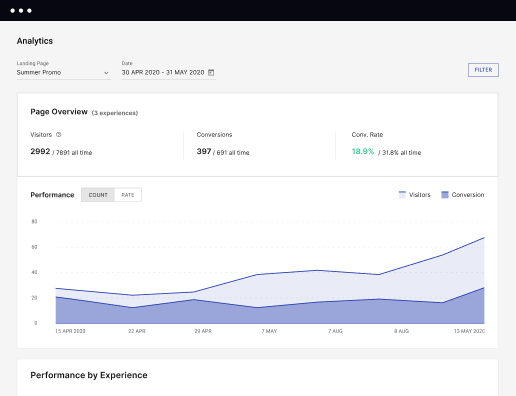
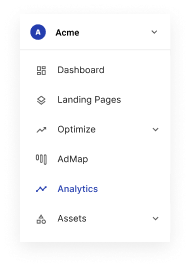
Easy to build without coding
With the intuitive drag-and-drop builder, anyone on your team can create high-converting pages without any knowledge of code or design. Make enhancements to your landing page with custom widgets using Javascript, HTML/CSS, or third-party scripts.
Multiple layouts for any industry and goal
Select from 500+ landing page layouts built to boost conversions across industry-specific scenarios. Customize them by adjusting fonts, adding images, and generating on-brand content with the AI assistant. Quickly scale with Instablocks® and Global Blocks that you can save, reuse, and update globally.
Loads fast and looks polished on any device
Every template is responsive, which means they present professionally on any device and load blazingly fast with our Thor Render Engine. You can also power them up with Google AMP technology to deliver an unparalleled mobile experience and drive higher conversions.
Robust analytics & experimentation
Get real-time updates and reporting across all your devices, showing the number of visitors, conversions, cost-per-visitor, and cost-per-lead. Launch AI-powered experiments, run A/B tests, and use heatmaps to analyze user behavior, then optimize your landing page to maximize conversions.
All the features you need to build lead-generating landing pages
Explore more featuresLearn how to build top-performing landing pages for any goal
FAQs
Leading the way in building high-performing landing pages





An <H2> guide to leveraging Instapage for effective landing page creation
Instapage's powerful landing page and conversion rate optimization (CRO) tools are designed to help marketers accelerate the performance of their digital campaigns. With a user-friendly interface and a variety of features that cater to different business verticals such as tech, education, and financial services, Instapage provides an efficient way to enhance online marketing efforts and drive ROI.
An why use Instapage for landing pages?
Instapage simplifies the process of creating landing pages that convert. With over 100 responsive templates, users can launch campaigns quickly without needing coding skills. The platform also facilitates real-time collaboration, which is beneficial for teams across different sectors.
- Ease of use: Intuitive interface allows marketers of all skill levels to create effective landing pages.
- Templates and libraries: Extensive library of high-converting templates and pre-built elements to streamline the design process.
- Collaborative features: Tools that enable instant feedback and contributions from team members or external stakeholders.
An optimizing your landing pages
To maximize the performance of your landing pages, focus on leveraging Instapage's built-in optimization features. These tools help you to test, iterate, and refine your page for better results.
- A/B testing: Experiment with different designs and messages to discover what resonates most with your audience.
- Heatmaps: Use detailed on-page analytics to visualize user interactions and make data-driven adjustments.
- Performance analytics: Access comprehensive dashboards to track page performance and engagement metrics.
An personalizing content for better engagement
Personalization plays a crucial role in enhancing user experience. Instapage allows marketers to deliver tailored content based on audience segmentation.
- Dynamic text replacement: Automatically customize headlines and messages to match user intent.
- AdMaps: Align specific ads with unique landing pages for better ad performance.
- Audience-level tracking: Monitor the behavior of different audience segments for targeted campaign strategies.
In conclusion, utilizing Instapage can significantly elevate your landing page effectiveness and overall marketing strategy.
To get started with Instapage, assess your current campaign goals and explore the various features available to maximize your output effectively.
People also ask about Material design maintenance page template
Material design maintenance page template: A comprehensive guide
Understanding material design principles in maintenance page templates
Material design, introduced by Google, has redefined how interfaces are crafted in the digital realm. Since its inception, material design has focused on creating intuitive and visually appealing user interfaces, emphasizing principles such as depth, motion, and tactile sensation. These principles allow designers to create a sense of physicality in the digital space, leading to a more engaging user experience. When applied to maintenance pages, which often signify a momentary loss of service, material design principles help create a bridge between functional downtime and the overall user experience.
The relevance of material design to maintenance pages cannot be overstated. A well-designed maintenance page should not only inform users about the downtime but do so in a way that feels consistent with the rest of the web properties of a brand. Furthermore, maintaining visual consistency during these downtimes can help in mitigating frustration caused by the unavailability of services, keeping users informed and engaged while they wait.
The role of maintenance pages in user experience
Maintenance pages play a critical role in the overall user experience during service disruptions. Transparency is pivotal; users need to know why a website is down and when it is expected to be back. An effective maintenance page should reflect a brand's professionalism and reliability, showing that the organization values its users' time and experience. This means communicating clearly and succinctly with the audience.
To capture the essence of effective communication during maintenance periods, brands can employ various strategies. For instance, employing friendly and reassuring language while providing time estimates for the resolution can help in managing user expectations. A navigation-friendly layout showing links to help centers or contact information can further enhance the experience during downtimes.
Exploring the building blocks of material design maintenance page templates
A maintenance page template serves a specific purpose—informing users of downtime while providing essential information. Key components typically include UI elements like buttons, cards, and typography that enhance user interaction. These components should be designed around the user journey, ensuring that anyone accessing the page can easily find the information they are looking for. Modular design can further enhance flexibility and customization, enabling brands to adapt their maintenance messages according to specific circumstances.
The composition of elements is crucial for optimal user engagement. Best practices suggest arranging content hierarchically, where the most crucial messages are more prominent. Utilizing cards and blocks for information will aid in a user’s ability to digest updates quickly. Additionally, whitespace should not be underestimated; it plays a vital role in ensuring readability and focus. Effective use of whitespace can help users sift through content without feeling overwhelmed, clarifying critical information.
Designing for users: Creating intuitive and efficient maintenance pages
User-centric design is foundational when crafting maintenance pages. Understanding the target users during downtimes allows designers to cater the messaging and overall page aesthetics to user expectations. Crafting messages that resonate involves using a tone and style that aligns with the brand's voice while providing clear and concise information relevant to the downtime. Additionally, considering integrating feedback loops to gather user sentiments on their experience during the downtime can lead to actionable insights.
UX strategies for effective maintenance pages should focus on a visually appealing interface without sacrificing informative content. Integrating smooth animations and transitions can provide a seamless experience during moments of disruption. However, accessibility remains paramount, ensuring that all users can navigate and find the information they require.
Integrating components: A deep dive into template elements
Essential UI components play a significant role in structuring maintenance page templates effectively. For instance, buttons should be styled to capture attention and promote action, such as reloading the page or navigating to help sections. Cards can structure content for easy digestion, showcasing social media links and ongoing updates to keep users informed of progress. The use of customizable blocks permits interchangeable design elements tailored to specific use cases or branding guidelines.
A cohesive design system enhances the creation of maintenance pages. Understanding that these systems act as guides for ongoing projects aids in ensuring brand consistency. When a unified design language is established, it promotes a seamless experience across multiple pages and streamlines updates. This centralized design strategy is vital for maintaining efficiency when addressing user needs and management.
Practical implementation: Steps for crafting a high-impact maintenance page
Crafting a high-impact maintenance page begins with thorough planning. Outlining the key messages and information to convey is paramount, ensuring that the downtime rationale is communicated clearly. Alongside message clarity, determining the aesthetic direction based on branding and user expectations is equally essential. This groundwork will serve as a roadmap toward executing an effective design.
The development process transitions from conceptualization to execution with the right tools and platforms for building and managing maintenance templates. Utilizing A/B testing strategies will allow for refining performance and enhancing user experience based on real-world interaction data. By iteratively testing different versions, businesses can pinpoint design efficiencies that resonate best with their users.
The future of maintenance page design: Trends and innovations
Emerging trends within web design for maintenance pages showcase a shift toward adaptive design. Tailoring experiences based on user behavior can keep engagement high even during service interruptions. The integration of AI and chatbots highlights a growing trend in utilizing technologies to serve real-time support, providing users with immediate assistance and information during downtimes.
As user expectations continue to evolve, brands must adapt accordingly. Predicting these shifts is crucial for strategic design decisions. Additionally, measuring success through specific analytics will offer invaluable insights into optimizing maintenance pages. Key metrics such as bounce rates and engagement times must be closely monitored to gain a deeper understanding of user interaction.
Real-world applications: Case studies of successful material design maintenance pages
Several companies have effectively utilized material design principles in their maintenance pages. These brands showcase how thoughtful design strategies can be employed for optimal user engagement during downtimes. By breaking down the design strategies of these successful examples, we can uncover valuable lessons. Elements like color schemes, typography choice, and messaging clarity emerge as key factors contributing to their effectiveness.
Feedback gathered from users provides another layer of insight. Real-world testing allows brands to iterate on maintenance designs based on user input, refining the user experience continuously. Creating an environment rich in feedback not only fosters user trust during outages but also enhances the overall design strategy moving forward.
Designing with purpose: The lasting impact of a well-crafted maintenance page
The relationship between professionalism and user trust cannot be overlooked during downtimes. A well-crafted maintenance page can play a pivotal role in shaping user perceptions of a brand. Strategic design initiatives that communicate transparency and reliability can significantly bolster brand loyalty, encouraging users to return once services resume.
Investing in user experience speaks volumes, even during moments of disruption. By continually integrating user feedback and analytically assessing performance, brands can harness the potential of their maintenance pages to transform perceptions positively. Ultimately, the goal should be continuous improvement and innovation, striving to enhance the maintenance experience and maintain user engagement.
Ready to skyrocket conversions?
Supercharge your ad campaigns with high-performing landing pages
Get started



